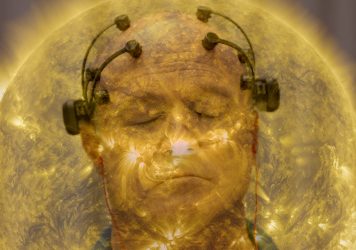Maximilien Van Aertryck and Axel Danielson set out to investigate the implications of the camera, from its invention to the present day, with mixed results.
In 1902, England’s King Edward VII was crowned. Two months earlier, Georges Méliès made a film about it in his French studio to be released at the coronation date. Reportedly, the king said, “What a fantastic machine!” and his exclamation gave directors Axel Danielson and Maximilien Van Aertryck an idea: a decade-long research process of examining the possibilities of the cinematic apparatus and the responsibilities that come with its evolution.
Fantastic Machine uses the form of a video essay to track historical and ideological highlights in the evolution of the camera, a man-made machine that promises to record and show reality as it is. An overarching theme that binds all the featured clips together – from Muybridge to TikToks – presents the camera as a mediator between humans and the world. The task falls on editor Mikel Cee Karlsson to string together scattered chronologies, materials of different quality and format, and the (barely articulated) political implications of it all.
Much of this is achieved in spite of a sparse, but declamatory voiceover, which in most cases resembles no more than image captions read aloud. In a way, the mark of a good video essay is having the edited footage speak for itself, and while that is the case here, the way Fantastic Machine is narrated leaves too much unexplored.
The backbone of the film can be pinned down to inventions and their evolution – of photography, moving image projections, desktops, green screens, television, selfie cameras – but the more important conceptual detours needed to make sense of these developments take a shortcut. At times, Danielson and Van Aertryck make good use of materials that are particularly intriguing in relation to cinema’s propagandistic qualities by suggesting there is continuity where one would see ideological difference.
An outtake of an ISIS-propaganda film or an interview of Leni Riefenstahl comparing the filmmaking logic to that of ballet pairs with allies’ footage of concentration camps to chilling effect. While these bits signal a regained trust in the camera as a witness, what is not addressed is the representational taboo haunting Holocaust imagery to this day.
Similarly, the film indicates there is more to framing and off-screen space than we are led to believe, but it never mentions the real nature of cinema: movement, as in, editing. A powerplay between conceal and reveal is not to be found solely in the camera, but in the way moving images are put together. As banal as this may seem, the omission of this truism (montage was originally done in-camera) takes away from the film’s self-reflexive potential. That said, Fantastic Machine makes for a decent A-level crash-course in media history, before you graduate to Kirsten Johnson’s far superior Cameraperson.
Published 15 Apr 2024
A Sundance winner for the meta-lovers.
There’s way too much going on here.
Still better than a YouTube explainer.

By Matthew Eng
Kirsten Johnson’s visual autobiography is a striking and knowledgeable account of a life in film.

Rat Film director Theo Anthony delves deep into the myriad ethical quandaries concerning mass surveillance.

Crackpot conspiracy or disturbing reality? Director Rodney Ascher investigates the murky world of simulation theory.